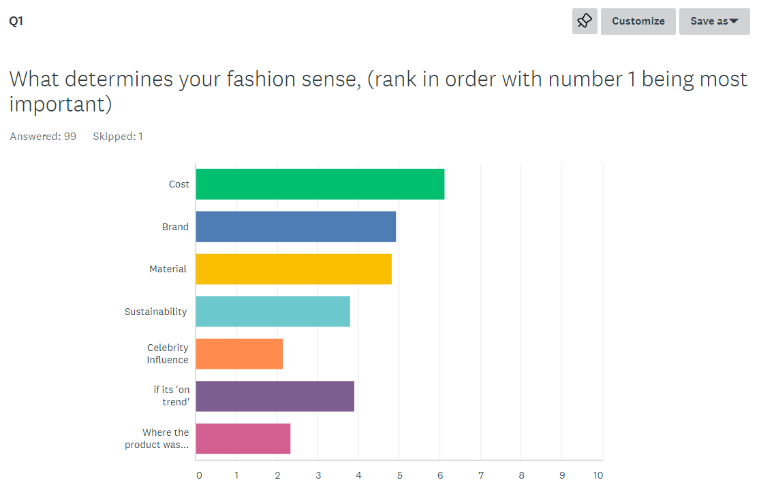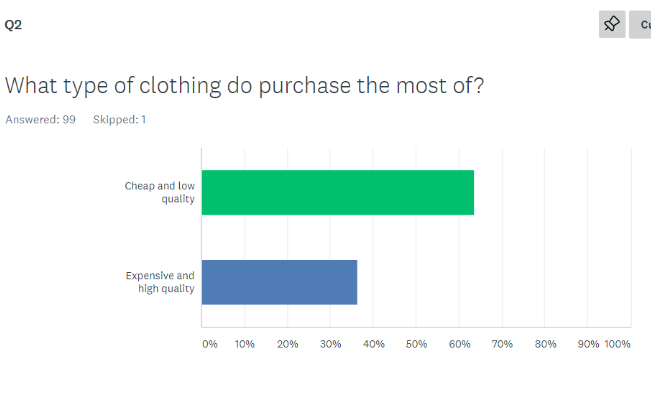Eco Fashion: Save the World and Shop with a Conscience
- Aaliyah Harris

- Jun 1, 2020
- 6 min read
PAUSE, nobody said hurting the planet is cute and neither is a toxic relationship with fast fashion.

If you’re trying to ditch old habits pick brands that truly give back to the environment.
Let’s be honest, most of us love a discount and have a slight addiction to an exclusive sale. But here’s why you must add sustainability to your shopping cart now.
London is the third biggest city in Europe. You’ll have seen the news about extreme weather, and how Greta and our beloved David Attenborough warned us that the climate crisis is just not ok. Now, more than ever we need to challenge where we shop and give the eco-fashion gamechangers some credit, as in take our money please!
So, what does “Fast Fashion” actually mean? It can mean a LOT of things but it’s all about what’s stylish, trending and profitable with little, if any consideration about the environmental cost. It thrives on being inexpensive and disposable (basically, you’re sucked into a bargain hunt that blinds you from reality). It’s quantity over quality and babe, who wants a wardrobe full of that?
Some of the big names involved in the fast fashion industry include Zara, H&M, UNIQLO, Boohoo.com, Forever 21 and Topshop. Many of these retailers copy or steal ideas from independent designers because fast fashion feeds on having to chase down new styles.
I spoke to three creatives who are fighting fast fashion with their inspiring, sustainable solutions.
MEET SOLENE ROURE…

Solene Roure is a footwear and accessories designer who helps companies transition towards sustainable fashion and apparel worldwide. Making history, she became the first sneaker designer for Louis Vuitton.
Boss Ladies Wear Sneakers Too
“I fell into sneakers because there weren’t as many women there,” says Solene. While working for brands she says: “Fashion and sports were very separated. 10 years ago, women had to wear high heels to a job interview for a company that sells sneakers! I wanted to change that”.
Feeling confident and empowered whilst wearing practical clothing doesn’t seem like too much to ask for. If men can do it then why can’t we?
It’s All About Democracy

Well I’ve got you covered! Primury is a unisex, responsible sneaker brand that focuses on minimalism. As their designer, Solene says: “We started five years ago with a Japanese influence. It was very important to make unisex sneakers so that gender didn’t affect the look”.
Primury represents an ethos about the deeper philosophies of sustainability. “We make versatile shoes that people can wear all the time for a very long time,” says Solene.
If you ever need an excuse to update your kicks, there’s no better reason than multiuse shoes. I mean after all, didn’t watching the Confessions of a Shopaholic movie teach us anything?
The Key To Shopping Sustainably
It’s difficult to imagine the pressure that companies have, to satisfy the high fashion demand but by changing the way we shop it’s a step in the right direction. Solene says: “The problem is that some brands just want to make money at any cost”.
Materials play an important part obviously, but that’s just one thing. “Recycled materials like plastic bottles are a lot of the time actually industrial waste. You must look at where the material comes from, how long it’s travelled for and if it’s made locally,” says Solene.
While we’re all stuck at home, waiting for the global pandemic to exit the chat (ahh yes talk of coronavirus again!), many people have seized the opportunity to work on their health and fitness. Home workout routines are all good and well, but have you stopped to think about the gym outfit that you’re Instagramming?
“Elastane makes sportswear fabric stretchy. There is no sustainable solution for elastane locally, you must source part of it in China making the carbon footprint a little bit higher,” says Solene.
Most High Street Brands Have Eco-Friendly Collections
“High street brands aren’t really doing much, they’re greenwashing,” says Solene as she sheds light on popular eco-campaigns.
Nope, Greenwashing isn’t to do with the garden or a nature infused laundry detergent. Fashion companies use marketing to persuade customers that their products appeal to nature and are made to benefit the environment, but this isn’t entirely honest.
Solene says: “If you look at what they’re doing it doesn’t fix the problem. For example, using too much organic cotton uses so much water and the chemicals involved are pretty bad”.
“Sustainability can take over fast fashion because we’ve got amazing scientists and solutions. But brands need to make an effort and the government must install penalties,” says Solene.
MEET IGUECO…

In the heart of Camden lies a precious and unusual gem. Igueco (pronounced ig-gwecko) takes pride in being the first in London to produce handmade fruit jewellery. Eek! It’s incredible and we need it.
OMG! What Fruit Are You Wearing?
Semir and Maja are business owners who started the company around 6-7 years ago. The idea came to them in Mexico while looking at coconuts. Ahh, we can feel it now warm, white sand and a crystal-clear ocean!
The jewellery is made from food already available in their kitchen and is preserved inside a silver-plated base. Simple enough? The process is trickier than it seems, and it can take up to two days to create an item.
Sam who works on the market stall says: “You need ripe fruit. It’s got to be just right, not too soft. You slice the fruit and dehydrate around 20-40 pieces and then apply an epoxy resin”.
Individual Style Over Mainstream Any day

Igueco stocks earrings, necklaces, cufflinks, tie clips, pens, key rings and more. The details, textures and colours in each wear are unmatchable to which Sam says: “The technique is in the drying and ripeness of the fruit”.
It’s difficult to believe that when looking at the jewellery, the material used to be something living. Literally, the fruit is soo beautiful with its glossy finish it looks UN-real. No product is the same and there’s a rare value about each item.
Igueco uses little energy as a home business and everything is sourced and handcrafted locally. Besides their staple fruit, they use flowers like clovers, buttercups, dandelion seeds, poppy seeds, coffee seeds, chilli flakes and one material that highlights their roots, starfishes.
Upcycling the waste products of washed up Starfishes on beaches and turning them into intricate designs, not only gives the animal a new life but it’s undeniably resourceful (not to mention cool).
The Star Of The Show

“The bestseller is the blood orange because it's got it's got a dramatic colour,” says Sam showing us the eye-catching piece.
The next time you’re thinking direct debit prepare yourself, why not shop with a local eco-fashion brand that has a real story?
“Don't forget this is Camden, you've got to expect the unexpected,” says Sam.
MEET HMP.CO…

Another admirable brand killing it in Camden Lock is Hmp.co. Founders, Nuga and Neil Manandhar spoke to us about how they use mostly vegan friendly materials to create their apparel.
Hemp is extracted from the plant Cannabis and is one of the strongest materials following bamboo and nettle. Likewise, its more durable than cotton and uses a lot less water in production meaning it greatly, benefits the sustainable fashion industry, yay!
Nuga the designer says: “I try to make something different. I use recycled or organic materials because Hmp.co is all about environmental safety”.
“The company started to help sustain the environment as well as help poorer communities in Nepal,” says Neil Manandhar.
Hmp.co uses Himalayan Hemp which, “has been used as a material resource in Nepal since the 1960s,” says Neil.
One of Hmp.co’s most unique products are lokta lanterns. Neil says: “Lokta paper is made from the fibrous inner bark of high elevation, about 3000 metres above sea level. It is durable and resistance to tearing, humidity, insects and mildew. Traditionally lokta paper was the preferred choice for the recording of official government records.”

So far, Hmp.co has made shirts, ponchos, jackets, shorts, felt shoes, brogues, slippers, wool scarves, pencil cases, backpacks, tote bags, drawstring bags, wallets, purses, dreamcatchers, lanterns, notebooks, coasters and soaps.

Although summer may seem like a distant dream right now, Hmp.co has the 411 on festival wear. Onto the best bit: the most distinctive feature about their sustainable fashion is the vibrant stitching design that uses Aztec and geometric patterns across all products.
Prices range from around £10-50 and their backpacks are a popular seller. Nuga says: “I like to play with colours and pockets in the bags so it’s appealing and useful”.
Other materials Hmp.co uses are Yakwool when making their delicate dream catchers because of its soft texture and recycled silk.
Sustainable fashion is crucial because it, “helps the environment by using less plastic and non-degradable products,” says Neil.
Girl, So Hold Up… What’s The Tea?
I put together a survey of over 100 participants aged 18-35 in the UK and investigated how people decide what clothes appeal to them.
64% of people answered, ‘Cheap and Low Quality’, when asked what type of product they purchase the most and 77% of people said the ‘Cost’, ‘Brand’ and whether the item is ‘On-Trend’ were the main reasons influencing their style.
Follow Aaliyah on Instagram.
This article was written in the style of Cosmo UK online, for a Fashion & Lifestyle assignment at University.
















We must be prepared consistently. You can't depend with your wellbeing systems and security locks constantly. You must be savvy to the point of free divorce lawyer having lawful security too. At any rate, you are not doing this for yourself. you are doing this the guarantee the endurance of your family.
The principal thing you should become familiar with is No one wins consistently, not even the old pros. Top to bottom examinations have shown that of Wikifx Broker Forex dealers lose every day.
Physiotherapy is for the most part over-looked when contrasted with clinical or careful regimens in the administration of fitclinic less-discussed medical problems like fibromyalgia.
A few specialists even recommend that making a CBD item for treating resting issues might be a more sensible method for moving toward the issue than chasing after regulation that would sanction cbd tinctures from one side of the country to the other.
SAP represents Systems, Applications and Products in Data Processing. It is the world's biggest ERM software. SAP was established in sap demand planning in Walldorf, Germany. Throughout the long term, it has developed to turn into the world's driving supplier of client server business arrangements.